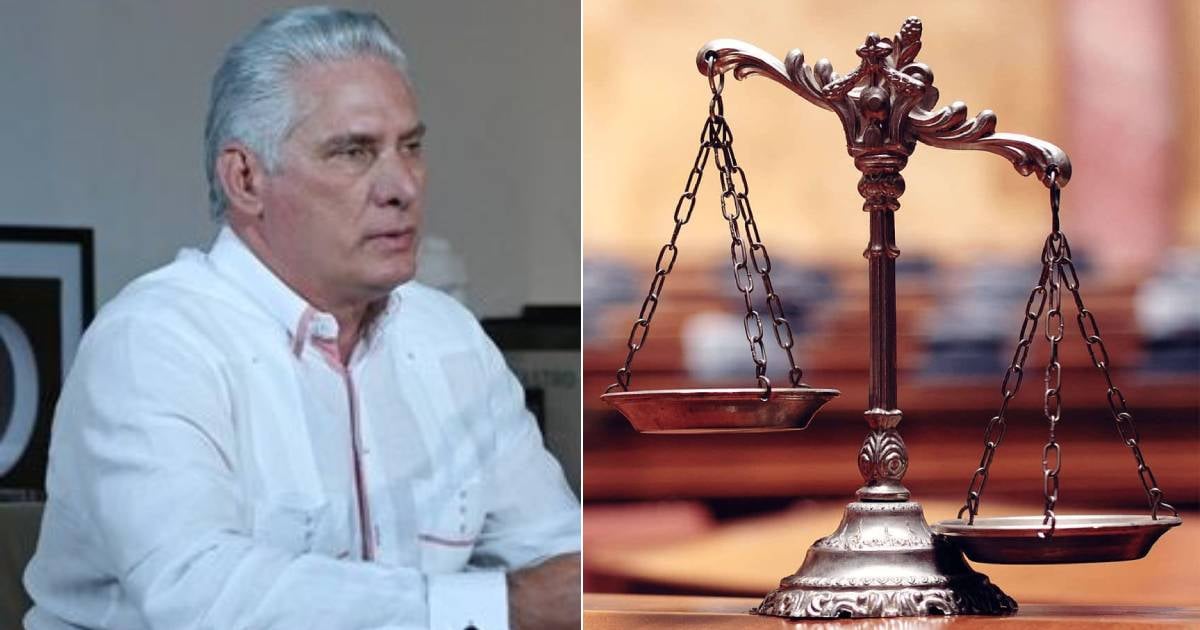Miguel Díaz-Canel, Cuba's appointed leader, once again invoked revolutionary rhetoric to emphasize the role of law in the nation's history during a celebration for legal professionals. He declared, "Cuba is a nation built on strong legal foundations." However, his statement has been met with skepticism both inside and outside the island, where many perceive the judicial system as a tool for punishing dissent and safeguarding political power.
In a post on "X," Díaz-Canel referenced historical figures like Céspedes, Agramonte, Martí, and Fidel Castro, describing them as "icons who found in the law both a tool and a support for their emancipatory ideas." He congratulated legal workers, expressing confidence that they will continue to "build and strengthen our Socialist State of Law and Social Justice."
Contrary to the notion of an impartial justice system, Cuba's legal framework has been criticized by various international organizations for being subservient to the Communist Party, where judges adhere to political directives and attorneys lack independence.
With biting irony, user @CalienteClavo commented, "Of course, Cuba has a solid legal tradition: judges who don't issue verdicts, they read them; lawyers who defend the government's right to crush its people; courts with pre-determined verdicts; and a Penal Code that instills fear rather than justice."
Another user, @Libertad12021, was more direct, stating, "In Cuba, there's no law, much less justice. Over 1,000 political prisoners are jailed for speaking up and demanding freedom. Crimes were fabricated to convict them. They are all innocent. Protesting is not a crime. What law and justice are you talking about, @DiazCanelB? You are cynical and shameless."
One of the most striking comments came from @Charliesway4eve, who dismantled the historical narrative presented by Raúl Castro's appointee. "Cuba wasn't forged in laws, but in the blood of those who dreamed of a republic for and by all. Martí fought against authoritarianism and the cult of personality. He died before seeing his dream hijacked. Fidel did the opposite: abolished freedoms, shut down newspapers, executed opponents, established a one-party regime, and turned the republic into his personal estate. Martí would have seen Fidel as the Latin American tyrant he feared most. He would have called him a traitor. With luck, he would have had him executed for usurping the cause of freedom in the name of totalitarianism."
Such comments reflect the frustration of a populace that refuses to be swayed by the regime's legal jargon. While the government celebrates anniversaries and quotes national heroes, thousands of Cubans remain imprisoned for expressing dissent, protesting, or simply disagreeing. International organizations like Human Rights Watch and Amnesty International have consistently reported that Cuba conducts summary trials, denies effective remedies to the accused, and criminalizes fundamental rights like peaceful protest and freedom of expression.
Following the protests on July 11, 2021, hundreds of Cubans, including minors, were tried and sentenced to lengthy prison terms through processes riddled with irregularities. Many of these trials were held behind closed doors, with fabricated evidence and witnesses exclusively from state security forces.
High-profile cases like those of Luis Manuel Otero Alcántara, Maykel Osorbo, or the young protesters from La Güinera, sentenced to decades in prison, are often remembered. In a country where access to independent legal defense is nearly non-existent, and where lawyers must belong to state-controlled organizations, the talk of a "State of Law" is, for many, just another mockery.
Understanding Cuba's Legal Controversies
What is the main criticism of Cuba's judicial system?
Cuba's judicial system is criticized for being politically subservient, with judges and lawyers lacking independence and trials often serving to punish dissent.
How have international organizations responded to Cuba's legal practices?
Organizations like Human Rights Watch and Amnesty International have denounced summary trials, denial of rights to the accused, and the criminalization of basic freedoms in Cuba.
Who are some notable figures affected by Cuba's legal system?
Notable figures include Luis Manuel Otero Alcántara, Maykel Osorbo, and young protesters from La Güinera, all of whom have faced harsh prison sentences.
